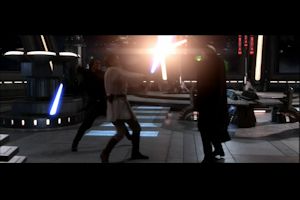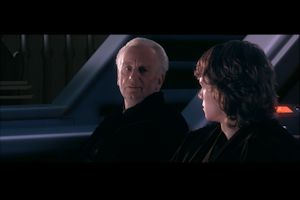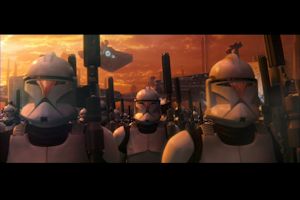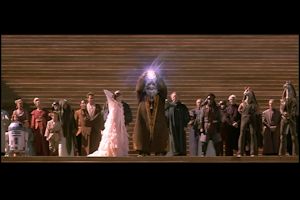5 Things the Star Wars Prequels Got Right
With a new explosion of Star Wars about to burst forth, let us not dwell on the mistakes of the past but rather all the great things that make us love Star Wars. I will admit this can be difficult if you sit down to rewatch the prequel Episodes I-III, and you don't need me to tell you why. In fact, instead of listing the multiple mistakes, missteps, and missed opportunities contained therein, I am going to list the things those movies actually do right. Yes, they are not 100% terrible, and here are five examples why.
#1
The Lightsaber Duels
|  |
#1
The Lightsaber Duels
|  |
The culmination of Jedi badassery is the lightsaber, an elegant weapon of a more civilized age. It's a straight sword, only made of laser. Every single Star Wars movie contains at least one major lightsaber battle between at least two Jedi. However, in the fog of youthful imagination and awe, it's easy to forget that the original trilogy battles were pretty lackluster, with Darth Vader lumbering around like a big, black tree trunk and Obi-Wan Kenobi moving about as quickly as you'd reasonably expect a sixty-two year-old Alec Guinness to move. Sure, Luke does a single force-powered jump in Empire Strikes Back and Darth Vader shows off his lightsaber throwing skills in Return of the Jedi, but even those battles are soporific compared to the amped-up, acrobatic, and intense battles of the prequel trilogy.
The teasingly short battle in The Phantom Menace between Obi-Wan, Qui-Gon, and Darth Maul, for example, contains more fight choreography in twenty seconds than can be found in the entirety of the original trilogy. It's also incredibly well thought-out, with lots of Jedi powers on display, some physical kicks thrown in, some flipping, some environmental hazards, and a double-bladed red lightsaber. It's the highlight of the movie, and even the most cynical fanboy has to admit that it was a downright orgasmic experience in the theater on opening night.
Then there's the gigantic Jedi brawl in Attack of the Clones, which shows lightsaber battles in a war zone, followed immediately by a tightly shot and emotional confrontation between Anakin, Obi-Wan, and Count Dooku, which is then followed up by the kinetic and never-before-seen sparring style of Yoda. As for Revenge of the Sith, it's just no contest. You have the massive force battle between Yoda and the Emperor in the giant halls of the Galactic Senate, and the much anticipated fight between Anakin and Obi-Wan in the exploding lava-filled depths of Mustafar. I'd be willing to entertain arguments that these battles rely too much on CG, but even taking that into account, these are easily the two best Jedi battles in all of the Star Wars films.
#2
The Music
|  |
#2
The Music
|  |
John Williams' score is one of the things that makes Star Wars so iconic, and it would be nearly impossible to improve upon his work in the original trilogy. However, he somehow managed to do it with the prequels. The music is objectively better, though the original trilogy--by virtue of coming first--would probably still win a contest for its originality (that sound you just heard was a bunch of snobby musicians having heart attacks at the thought of John Williams being called "original," but they can suck it, because all modern music is inherently derivitive and John Williams is an artistic genius).
In order to prove my point here, let's go back to that lightsaber battle in The Phantom Menace, where John Williams busts out his epic "Duel of the Fates":
I don't care how iconic and memorable the "Imperial March" is from the original trilogy (and it most definitely is both of those things); it just doesn't hold a candle to that. Williams' work in Episodes II and III is also amazing, but "Duel of the Fates" is his greatest Star Wars-related achievement, one of the pinnacles of his incredible career.
#3
Subtext
|  |
#3
Subtext
|  |
Nobody could accuse any of the Star Wars movies of an over-reliance on subtlety, but if there's a case to be made, it would be found in Revenge of the Sith. Beneath the obvious good versus evil analogies, the petty jab at the Bush Doctrine (replete with the self-defeating "only a Sith deals in absolutes" line), and the painfully inept tragic love story, there actually is an interesting and provocative theme about what happens to a man who is given too much power over life and death.
If you pay close attention, the movie drops plenty of hints that the Emperor--the embodiment of all evil in the Star Wars universe--has actually learned how to control life itself. He is not only directly responsible for killing Luke and Leia's mother through the Force (no, she didn't die of a broken heart, because that's stupid), but there is every reason to believe that he created Anakin from the Force itself in order to mold a true servant of the Dark Side. All that seemingly irrelevant exposition about midi-chlorians in The Phantom Menace actually helps explain where Anakin comes from, how the Emperor immaculately conceived him. Also, there's no way Anakin could have survived the aftermath of his battle with Obi-Wan at Mustafar--when Palpatine finds him, he is clearly and irreversibly dead--but somehow, the Emperor brings him back as the breathing-impaired cyborg we all know and love.
Think about it. Anakin's descent begins with his mother's death in Attack of the Clones, the moment he realizes that he doesn't have the power to keep her alive forever. He takes out his anger on the Tusken Raiders, mercilessly robbing them of the life he couldn't imbue on Shmi. Then, in Revenge of the Sith, it's no coincidence that his impending fatherhood is part of what drives him down the dark path. He resents Padme--hates her even--because she has the power to create life and he does not, so when the Emperor offers him the opportunity to take a whole bunch of lives in the service of a greater purpose, he accepts. As with the Tusken Raiders, he concludes that, if he can't make life, he can certainly take it away. This resonates all the way to the climax of Return of the Jedi, where he again makes that choice, choosing to kill the Emperor and let himself die, only redeemed by the fact that doing so gives Luke the chance to live.
Go back to his final confrontation with Obi-Wan in A New Hope, and you'll see subtext that only reveals itself when you take all of this into account. By sacrificing himself, Obi-Wan is proving that he is more powerful than Vader, because he can control his own death and shape the future of Anakin's children through his sacrifice (which is how he "becomes more powerful than you can possibly imagine"). This is a lesson Anakin only learns at the very end, but without Revenge of the Sith and its subtle meditations on how to control life and death, it isn't as meaningful. I'm not going to pretend that George Lucas had all this in mind when he wrote A New Hope (I'm not even convinced he knew that Luke was Vader's son), because if he didn't, that only strengthens my argument that, through the prequels, he actually improved upon his overarching story in a few key ways.
#4
Defying Expectations
|  |
#4
Defying Expectations
|  |
When he finally made the decision to make the prequels, George Lucas faced a crippling problem: ludicrously high fan expectations. On opening night of Episode I, God himself could have come down through the theater roof and granted every audience member eternal life in paradise, and they still would have been disappointed that they didn't get the movie they wanted. For the most part, obsessive fans of Star Wars already had the prequel stories laid out in their minds--Anakin is a hotshot fighter pilot in something called the Clone Wars who turns evil while studying Jedi arts under Obi-Wan Kenobi, and Palpatine somehow becomes the Emperor and turns a "civilized" Galactic Republic into the brutal empire--and had filled in the details with the things they wanted to see. I'm not saying The Phantom Menace is an objectively great movie that has been unfairly judged by the unmanaged expectations of its built-in fanbase--because it is definitely a flawed movie worthy of much criticism--but I am saying that Lucas knew this was a sticking point going into it.
As such, he had to give audiences something unexpected, something different enough to keep them entertained and to distract them from the movies they had already watched a hundred times in their dreams. He managed to deliver the essential plot beats, but when it came to the details, he did a good job keeping us guessing. Who could have predicted that stormtroopers were not only the titular clones of the Clone Wars but that they originally fought alongside the Jedi in order to gain their trust for the inevitable betrayal? Who would have known that, on the surface, the Clone Wars would essentially be the same thing as the rebellion of the original trilogy, only with the bad guys on the rebelling side and the good guys fighting for the corrupted governing body of the galaxy?
Not all of his choices work, of course. For instance, it is certainly a surprise to discover that C-3PO was originally a creation of a young Anakin Skywalker, but it's also a massive coincidence that blows suspension of disbelief right out the window. Still, the flawed trilogy we got from Lucas is probably a far sight better than what we would have gotten had he tried to appease the masses by delivering exactly the story they expected.
#5
Existing
|  |
#5
Existing
|  |
Try to remember what the world was like before the prequels were announced. George Lucas was adamant that he was done with Star Wars, even though he teased us with assurances that there were six other movies laid out somewhere, probably in a locked vault under his home at Skywalker Ranch. We were forced to watch the original trilogy and futilely dream about what Episodes I-III and VII-IX would be like. We had to curse the unfeeling God that created a world in which Star Wars existed but was doomed to be forever incomplete.
Well, now we have Episodes I-III, and we will soon have the rest, along with several more movies we didn't even dream of. Sure, the prequels are not as great as we want them to be, but they happened, and they make a future with more Star Wars possible. If not for the prequels, Lucas would likely still retain all the rights, Disney would probably not be involved in making more Star Wars films, and the canon would consist of nothing more than an ever-more-obscure collection of contradictory novels, comic books, and video games, all clutching for just an ounce of the greatness that defined the original trilogy.
Even if, improbably, Episodes VII-IX were to happen in a world without the prequels, they would be worse for it, because the prequels would not exist to provide caution. Perhaps George Lucas would still be in the director's chair, spouting a dozen bad ideas for every genius one he has without anybody close enough to him to tell him the difference. At the end of it all, just ask yourself which you would rather have: a disappointing prequel trilogy done by an unhindered George Lucas, or an Episode VII with Jar Jar Binks as "the key to all this."
-e. magill 8/26/2015
|
|